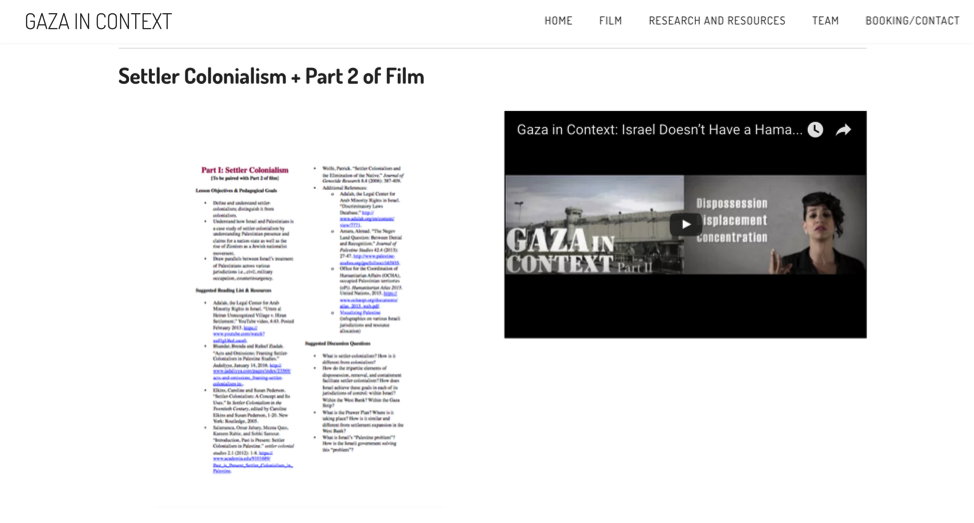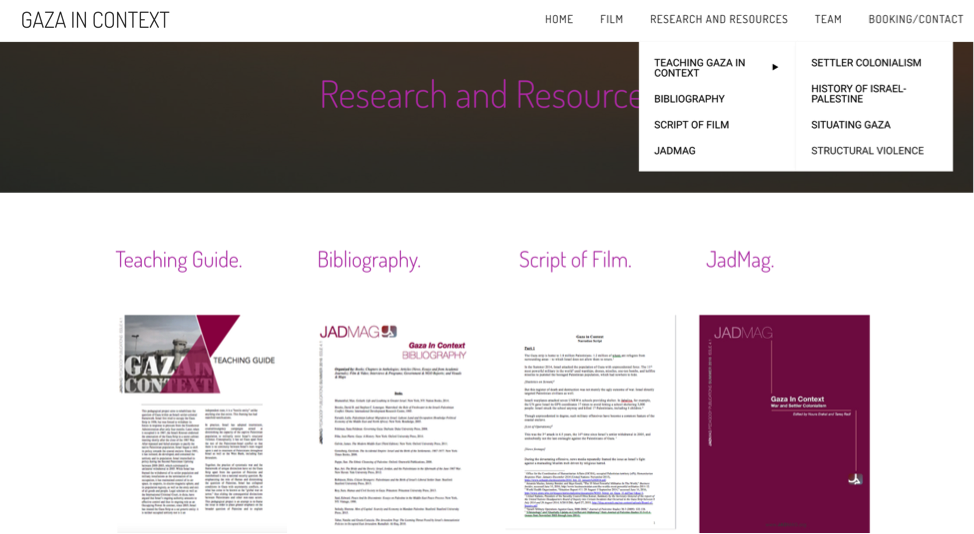Israel does not have a Hamas problem, it does not have a Gaza problem, it has a Palestine problem. It has been two years since Israel’s most brutal attack on the Palestinian people of Palestine in its history. Despite overwhelming evidence of the disparity of power between Israel and all Palestinians and the aggressiveness of Israel`s exercise of its power, including excessive and brutal violence and collective punishment in Gaza in the form of occupation, siege, and frequent military assaults against dense and captive civilian populations, mainstream media and educational materials continue to frame Israel as the victim. This pedagogical project aims to correct the propagandistic character of mainstream media and educational coverage. Gaza in Context provides historical context, explaining Palestinian resistance, for what has been an Israeli narrative that exceptionalizes Gaza and removes it from the larger Palestinian struggle. This is an opportunity to understand the violence and Israel’s settler-colonial project.
A 20-minute multi-media film that combines lecture, animation, typography, and footage from Palestine is the centerpiece of the project. Its other components include a teaching guide for instructional purposes, a bibliography for research purposes, and a compendium of Jadaliyya articles featured in what we call a JadMag. All of these elements are housed on the project’s own website, which is part of a larger research project on Palestine headed by the Forum on Arab and Muslim Affairs at the Arab Studies Institute. All of these are open-source materials and available to all.
Watch the full 20-minute film or watch one of its four, 5-minute parts.
The film is also available in four 5-minute parts. Each part corresponds to a teaching guide for use within the classroom and beyond. The four parts include: Settler-Colonialism, the History of Palestine-Israel, Situating Gaza, and Structural Violence.
As part of a larger research project, Gaza In Context includes a JadMag entitled, Gaza In Context: War and Settler-Colonialism that features a compendium of relevant Jadaliyya articles as well as a bibiliography featuring 108 sources.
Watch the tutorial to help you navigate the site.
What is being said about Gaza in Context?
"I did not think it was possible to examine in 20 minutes what Gaza in Context does with such compelling clarity: Israeli policies toward Gaza and Palestine, which are inseparable; the core problems affecting Gaza and the deliberateness of the policies that have led to Gaza`s disablement; Gaza`s centrality in the Israeli-Palestinian conflict; and some common myths surrounding Gaza and the history of the conflict overall, which are straightforwardly debunked. An immensely valuable teaching tool, the film`s power also lies in its fundamental humanity, a heartfelt entreaty to end the oppression and violence so that all people in this tortured part of the world may aspire to a future in which their children can flourish."--Dr. Sara Roy, senior research scholar at the Center for Middle Eastern Studies, co-chair of the Middle East Seminar, and co-chair of the Middle East Forum at the Center for Middle Eastern Studies at Harvard University.
"Gaza in Context is a superb film accompanied by an excellent teaching guide with seminal articles on the various aspects of the subject, discussion questions, reading list and bibliography. Not only does the 20- minute- film provide the essential facts necessary for an understanding of the problem it helps the viewer understand the context, history and nature of the Israeli policy that brought the Gaza Strip to where it is today. It does this without committing the common error of treating Gaza in isolation from the rest of Palestine but helps explain the consistency in the Israeli policy over the years and throughout Palestine while focusing on its implications and manifestations for Gaza. The film ends with a cri de Coeur to all of us to do what we can to bring an end to what the film convincingly argues is not a natural but a human-made disaster, and save Gaza from continuing to be a zone of death."-- Raja Shehadeh, Palestinian lawyer, novelist, political activist, affiliate of the International Commission of Jurists, and a founder of the human rights organization Al-Haq.
"Israel`s deliberate fragmentation of the Palestinian people and their land for the past 70 years has also fragmented the Palestinian narrative and struggle for rights. This is just one reason why it is vital that efforts to stop and reverse Israel`s colonization project adopt a holistic framework of analysis. Gaza in Context does just that: It zeroes in on Israel`s repeated assaults against the besieged strip but then broadens out to show how Israel`s attacks on Gaza are part of a consistent plan against the entire Palestinian people, a plan that from day one has sought to minimize the number of Palestinians in historic Palestine and maximize the number of Israeli Jews. The 20-minute film and accompanying educational materials succinctly provide the missing context in so many accounts of the conflict. It is an excellent entry point for the many thousands who are beginning to support Palestinian rights and an important refresher for others that have been involved in the movement for longer. Spread the word!" --Nadia Hijab, Executive Director, Al-Shabaka: The Palestinian Policy Network
"Gaza in Context is a fantastic educational instrument, conveying in 20 minutes what it would take most people a lifetime to learn. It gives an accurate and visually brilliant portrayal of the tragedy that has befallen not only Gaza, but the entire Palestinian people."--Dr. Richard Falk, Professor Emeritus of International law, Princeton University, former United Nations Special Rapporteur to the Occupied Palestinian Territories.
"Gaza in Context is an excellent educational resource that places Israel’s ongoing attacks on Palestinians in Gaza in their proper political context, that of settler colonialism, resistance to such colonialism and the Palestinian struggle to stay alive. In 20 minutes, this film debunks many of the Israeli-perpetuated myths — myths that have been conveniently adopted by others — by focusing on facts. The various articles and discussion questions accompanying the film serve as essential tools for those wishing to learn more."-- Diana Buttu, Palestinian lawyer, analyst and former advisor to the PLO.
“Gaza in Context should be required viewing for everyone, including those familiar with the situation in Palestine. Powerful, informative, and persuasive, Noura Erakat delivers a fusillade of facts with concision and passion, obliterating in twenty minutes some three decades of media misinformation about Israel’s occupation of Palestine. An effective teaching tool, irrespective of one’s political position.” -- Robin D. G. Kelley, Professor of History and African American Studies, UCLA
MORE AT WWW.GAZAinCONTEXT.COM

